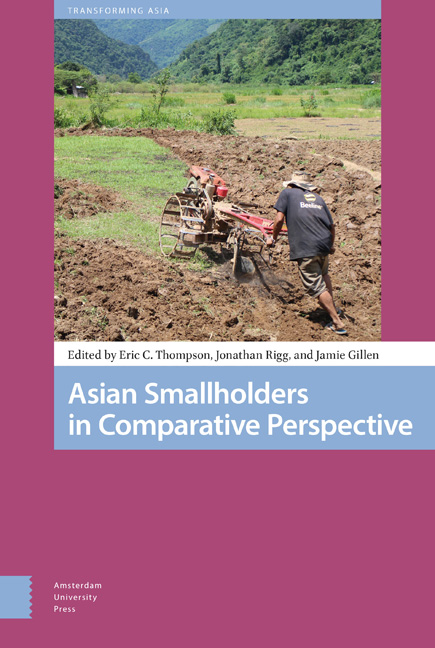Book contents
- Frontmatter
- Contents
- List of Maps, Figures and Tables
- Preface
- Introduction: Asian Smallholders in Comparative Perspective
- 1 Cambodia: Political Strife and Problematic Land Tenure
- 2 Indonesia: Whither Involution, Demographics, and Development?
- 3 Japan: Government Interventions and Part-time Family Farming
- 4 Laos: Responding to Pressures and Opportunities
- 5 Malaysia: The State of/in Village Agriculture
- 6 The Philippines: Fragmented Agriculture , Aquaculture, and Vulnerable Livelihoods
- 7 Singapore: Making Space for Farming
- 8 Taiwan: Toward the Revitalization of Smallholder Agriculture
- 9 Thailand: The Political Economy of Post-Peasant Agriculture
- 10 Vietnam: From Socialist Transformation to Reform
- Index
2 - Indonesia: Whither Involution, Demographics, and Development?
Published online by Cambridge University Press: 21 November 2020
- Frontmatter
- Contents
- List of Maps, Figures and Tables
- Preface
- Introduction: Asian Smallholders in Comparative Perspective
- 1 Cambodia: Political Strife and Problematic Land Tenure
- 2 Indonesia: Whither Involution, Demographics, and Development?
- 3 Japan: Government Interventions and Part-time Family Farming
- 4 Laos: Responding to Pressures and Opportunities
- 5 Malaysia: The State of/in Village Agriculture
- 6 The Philippines: Fragmented Agriculture , Aquaculture, and Vulnerable Livelihoods
- 7 Singapore: Making Space for Farming
- 8 Taiwan: Toward the Revitalization of Smallholder Agriculture
- 9 Thailand: The Political Economy of Post-Peasant Agriculture
- 10 Vietnam: From Socialist Transformation to Reform
- Index
Summary
Abstract
The transformation of Indonesian smallholders is linked to the developmental stages of certain agricultural and social systems in Indonesia’s history. These phases include the agricultural exploitation of the colonial period and extend to the recent phenomenon of rural development decentralization. The issues faced by smallholders range from the contexts of involution to that of rural development progress. These include the limited capacity of small-scale farmers and the influence of complex external pressures resulting from dynamic socioeconomic and political forces. In the contemporary period, the economic standing of smallholders has risen. Yet, considering how limited the progress of Indonesia’s agricultural sector is relative to other non-agricultural and urban sectors, the underdevelopment of smallholders remains a persistent problem.
Keywords: agriculture transformation, Indonesia, rural development, smallholder persistence
Smallholders are a significant part of the Indonesian economy with about one third of the working population employed in the agricultural sector (BPS-Statistics Indonesia 2013). In 2014, Indonesia was ranked third in the world after China and India in terms of the number of agricultural holdings in the country. However, Indonesia is ranked nineteenth in the world in terms of agricultural land area, with a total area of 485,000 km2 (FAO, 2016). These statistics illustrate the discrepancy between the limited amount of farming land and the high number of agricultural holdings in the country. This suggests two things: first, that a significant number of landholdings in Indonesia are small in size and second, that the Indonesian agricultural landscape is largely characterized by smallholders.
There is an extensive record of research on smallholders in Indonesia. Some work on the agricultural economy of smallholders conducted between the late colonial era and the beginning of Indonesia's independence still provokes discussion and continues to contribute to the advancement of knowledge amongst contemporary scholars. Many papers from this period highlight the pessimistic conditions of agriculture in Indonesia (Booth 1989; Geertz 1963; Boeke 1953). Boeke discusses social dualism in the country through a comparison of the colonial capitalistic system and the indigenous pre-capitalistic agrarian community. Additionally, Geertz illustrates the process of agricultural involution, particularly in Java, through which an increase in agricultural productivity and output did not lead to an increase per capita output. Among the scholarly works are some critical voices such as those of Gordon (1992) and White (1983).
- Type
- Chapter
- Information
- Asian Smallholders in Comparative Perspective , pp. 57 - 80Publisher: Amsterdam University PressPrint publication year: 2019



